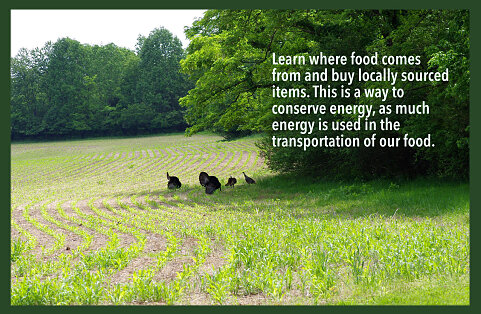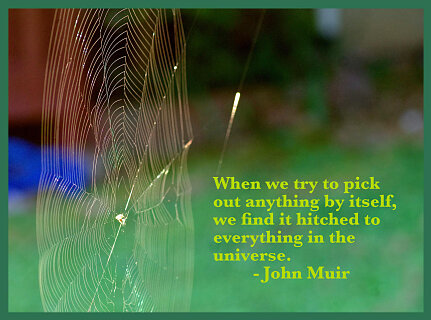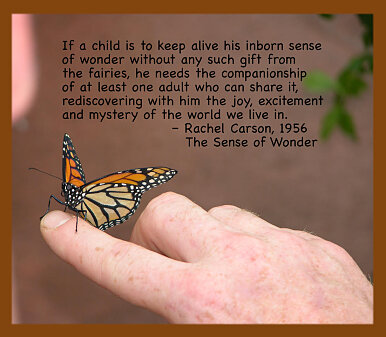Practice
Individually, as a family, and as a congregation, we play a significant role in caring for creation and for justice related to the environment. Here are ideas and inspiration to help us take action!
Scripture Guides Us
The earth is the LORD’s and all that is in it.” Psalm 24:1a reminds us the earth is not the property of humans to use or abuse as we please. Rather we are called to be caretakers, stewards of this place God has entrusted to us. To be faithful requires we choose actions that honor that sacred trust.
Jesus told the story of a Samaritan who crossed a social boundary to help a “neighbor.” Today, we are called to care for our neighbors of the future, which means shifting our thinking to cross the boundary of time and swinging into action now on behalf of all Creation. Our children, grandchildren, and their children count on us to be faithful with our Earth.
Do you know someone with asthma or COPD? The air pollution that affects our climate also harms the health of people. Jesus challenged us to care for the “least” among us, including children and older adults whose lungs are vulnerable. COVID shows us that people in poverty and people of color especially suffer from compromised health due to air pollution. Climate action is also action for justice.
In 1 Corinthians 3:6 Paul wrote, “I planted, Apollos watered, but God gave the growth.” Continue to do your “planting” for creation care and justice. Others will assist, and God will give the growth. Your job is to be faithful in your task even if you don’t see results. Trust God to be faithful too.
Food
 Cattle contribute to global warming through their methane “burps” and especially through the farming practices that deforest the land for the use of the livestock. Switch to ground turkey for burgers, meatloaf, and other dishes that traditionally have called for beef. It tastes good, and it’s good for the earth.
Cattle contribute to global warming through their methane “burps” and especially through the farming practices that deforest the land for the use of the livestock. Switch to ground turkey for burgers, meatloaf, and other dishes that traditionally have called for beef. It tastes good, and it’s good for the earth.
Less meat in our diets is proving to be healthier for the planet and for people. Especially given COVID restrictions and news about conditions for workers in meat processing facilities, now is the time to make more of your meals meatless. Recipes are readily available. Try them for the sake of the planet, your health, and justice.
Composting will help us ensure food scraps that won't go into a landfill.
Why compost, you ask?
Between 20-45% of landfills are organic materials that could have been composted, while 40% of the food grown in the U.S. is wasted. This organic waste creates methane gas, a more potent gas than carbon dioxide (CO2). Our local landfill has only 5 more years before reaching capacity, increasing costs if it is required to haul greater distances. Composts are a natural way to nourish the earth, create a zero-food-waste household, and decrease our impact on the planet.
What can we do in Nashville?
You can start by composting in your back yard. Search online for how-tos on popular websites or let Ty Finch, a WEUMC and Creation Care Committee member, introduce you to Bokashi composting in less than 3 minutes. See his video under West End's Creation Care Short Videos here. There are also commercial systems you can purchase for your home, like those from Vitamix, Lomi, Aeromix, and many more.
There are free organic waste dropoff points at Davidson County Convenience Centers here. You could also hire a company like Compost Nashville who will pick up your organic waste and turn it into compost for you.
Conduct a waste audit. For up to a week, keep track of what normally would be discarded. Could it have been reused, recycled, or composted? If it is excess packaging, were other options available? What about leftovers? What might you do to minimize food waste? Consider enlisting your whole family as Waste Erasers.
Emissions & Energy
Let there be light! LED (light emitting diode) bulbs are brighter, yet much cooler, and use 90% less energy than incandescent ones. Costs are coming down, and the bulbs last much longer. Brighten up your home with LED.
Safer at home orders have resulted in reducing global emissions about 25%, resulting in air and waterways clearing appreciably. When the crisis passes, find ways to continue driving less so the planet isn’t subjected to a rebound effect of increased emissions.

From COVID-19 we’ve learned that individual efforts are important but not enough. To end a crisis, governments and businesses must change their policies and practices. Individuals and communities need to exert organized pressure on them to act with urgency to curb emissions and move us into a clean future. Join a group. Speak up! For more information and for the addresses of key people in government, go to our Creation Care Advocacy Page.
When washing clothes, reduce the use of hot water. Heating the water soaks up nearly 80% of the energy required to do a load of laundry. Studies show that cooler settings are just as effective for cleanliness.
Recycling & Plastic
New reusable products made of beeswax become an eco-friendly alternative to plastic wrap for keeping food fresh. Check out the options on the internet.
When you are shopping, look at more than just the product. Evaluate the packaging. Go for minimal or recyclable materials. Avoid plastic wrappings that will have to be trashed and stashed in a landfill.
Watch what you recycle. We want to do our part, but 25% of what is going into recycling facilities can’t be recycled and contaminates the output. 1) Make sure the items are clean, not fouled with food. 2) Know your local guidelines. They are different in different places. Here are the guidelines put into place for Metro Nashville: HowToRecycleRightNashville.pdf
Plastic bottles or aluminum cans? Does it matter which you choose? Yes! Technically, both are recyclable. However, due to multiple factors beyond putting it in the recycling bin, plastic is less likely to be made into new products. On the other hand, the systems for recycling aluminum are much more effective. Choose aluminum whenever you can.
There are also ways to recycle your excess glass since Nashville recycling centers collect glass. There are also two curbside glass recycling services: Just.Glass and Recycle Nash.
Trees
Deforestation is in the top five factors contributing to global warming. Several reputable organizations are working to reforest areas around the world. Consider donating trees in honor of someone you love as a birthday gift, for example. Look at One Tree Planted for possibilities (onetreeplanted.org) or Trees for the Future (trees.org)
Don’t trash that partially used paper. Don’t even recycle it, yet. First, Reuse it. Keep a shallow box lid and a pair of scissors near your desk. When the main purpose of the paper is finished, salvage the empty portion for reusable scrap paper. Stack the pieces in the box lid to keep them neat and nearby for easy use. You’ve saved a tree!
Throwing away a used paper towel is essentially throwing away a tree. Trees inhale carbon dioxide and exhale oxygen. We need trees. You need an easy cleaner-upper too. Go back to basics—the rag bin. Grab a rag and you are reusing a resource that is past its prime but is still good for messes. And it’s washable. You don’t have to throw it into a landfill.
Stop throwing away your single-use paper napkins. Instead, use cloth napkins and simply toss them into the laundry. Find some distinctive napkin rings to mark each person’s napkin and reuse the napkins a day or two before washing. If you visit garage sales, you can likely rescue napkins and rings from being trashed. Take your inspiration from the kids!
Water & Oceans
Install one or more rain barrels to catch the run off from your gutters. You can save it for a non-rainy day and water your garden when needed. Many local county and municipal governments, as well as environmental agencies, distribute rain barrels inexpensively.
According to a Harvard study, the average American shower uses 2.5 gallons per minute. Do a personal or family assessment—time your showers for 2–4 days. Take an average as a bench mark. Then accept the challenge to reduce the amount of water used. As a bonus, shorter showers also draw less energy to heat the water, which reduces their environmental cost.
In some regions drought is a fact. Conserving water is important for the planet. Calculate your water footprint with this tool (watercalculator.org) so you have a baseline of usage. The calculator also gives practical tips for reducing use.
Whales are the new “canaries.” Opening their mouth to filter the ocean water for food, they are getting plastic instead—and dying. Oceans and marine life need our help. Take action—sign petitions, make calls, use social media—to pressure corporations, cruise lines, and local, district, and federal governments to stop plastic pollution. Find your government representatives' addresses here.
Advocacy
Speak up! Comment to businesses and corporations, urging them to find ways to provide products, packaging, practices, and services that do not harm the environment. Also thank them for any of their obvious choices to do Earth some good. Send an email or letter or contact them through their website.
Speak up about the climate crisis and the need to vote with the environment as a priority. Talk so others will listen. Start by respecting the other person, be sure to listen, work to build a relationship, and be an example—walk the talk. You don’t have to convince! But you are planting seeds of change.
Lobby your elected officials to support legislation that reduces carbon pollution. Reach out to federal, state, and local lawmakers. Enlist your networks in the task. Share what you are doing on your social media. Encourage others to act. Find a list of elected officials here and contact them.
Numerous climate justice organizations are doing excellent work. Explore them to continue to educate yourself. You may also choose to sign advocacy petitions, which will be sent to appropriate policy makers, or to support the organization’s work financially, knowing that you—through these groups—will continue to make a positive difference. Here are few such opportunities.
Buy Local! Buy Used! Buy Green! There are many ways you can change your shopping habits to create a more sustainable footprint. Check out this great article shared by our young friend, Amelia!
Children

A new baby brings joy—and a lot of plastic waste! Choose baby products made from sustainable resources and ones that can also be passed along to other families. Browse the internet for sustainable diapers and diaper bags, as a starter. For a baby shower, let family and friends know that sustainable is not just for your baby but also for the future of all babies.
Engage the children in your life in nature activities that create a sense of wonder. Together, grow something—a flower from a seed, in the garden or even in a window, a tomato plant or cucumber on the deck, a pumpkin vine. Talk about the delight you feel in God’s creation. You’ll be planting seeds of caring in the younger generation.
Poachers are killing elephants to sell their ivory. But specially trained dogs are on the job, sniffing out smugglers and consequently curtailing the trafficking of ivory and other wildlife “products.” Introduce your children or grandchildren to creation justice through the stories of these dogs and the elephants they protect. Learn more from African Wildlife Foundation (awf.org).
Shutting off lights when not in use is something even preschoolers can do. Such a seemingly little thing can help the younger generation grow up more aware of needing to take care of the earth. Teach your children they have the power to make a difference for good. And if they remind you when you forget the off switch, just say, “Thank you! Good job!”—and smile!
